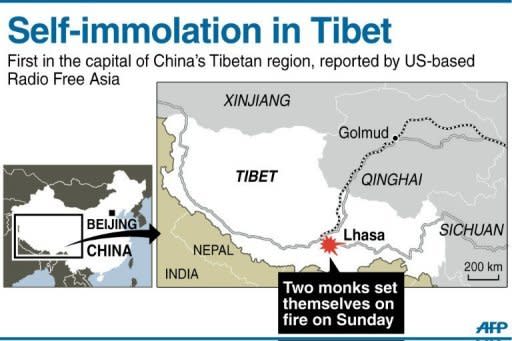Two Tibetans set themselves ablaze in Lhasa: reports
Two Tibetan men have set themselves on fire outside a temple in Lhasa and one has died, reports said Monday, as a wave of self-immolations in China's Tibetan areas spread to the heavily guarded city. Sunday's incident marked the first time such protests have taken place in the Tibetan capital, which has been under tight security since deadly anti-Chinese government riots broke out there in 2008. US-based broadcaster Radio Free Asia said the men were monks who joined a protest against Chinese rule outside the Jokhang temple, a renowned centre for Buddhist pilgrimage in the centre of Lhasa, before setting fire to themselves. China's official Xinhua news agency said police put the flames out "in minutes" and that one of the men, named Dargye, survived and was in a stable condition. Xinhua, which did not identify the men as monks, said Dargye was from Aba county in southwest China's Sichuan province, where many of the recent self-immolations have taken place. Aba is home to the Kirti monastery, which has been under virtual lockdown since a young monk named Phuntsog set light to himself and died in March 2011, sparking mass protests there. Xinhua named the dead man as Tobgye Tseten, from Gansu province, which borders Sichuan and also has a large population of ethnic Tibetans. Residents of Lhasa said the city was under even tighter security than usual following Sunday's protest, with police and paramilitary officers out in force. One resident contacted by AFP on Monday said police were carrying out identity checks in the street and that mobile telephone signals had been blocked. Free Tibet, a London-based campaign group, said it had received reports that Tibetan residents in Lhasa had been arbitrarily detained in the wake of the protest, while residents from Aba had also been targeted. Police also arrested the owner and some staff of a restaurant in Lhasa where Tobgye Tseten, identified by Free Tibet as Dorjee Tseten, 19, had worked for "some time," the group said. "Residents of Lhasa are reluctant to speak about yesterday's event because they know that the repercussions for communicating with the outside world are severe for themselves and their families," it added. Security authorities in Lhasa contacted by telephone refused to comment on the incident, which took place as Tibetan Buddhists celebrated Saga Dawa -- the anniversary of Buddha's birth. But a senior Tibet official quoted by Xinhua condemned Sunday's protests. "They were a continuation of the self-immolations in other Tibetan areas and these acts were all aimed at separating Tibet from China," said Hao Peng, the Communist Party secretary in charge of political and legal affairs in the region. Tibet's government-in-exile said it was "seriously concerned" about the reported incidents. The Central Tibetan Administration, based in the northern Indian hill town of Dharamshala, said in a statement: "The situation in Lhasa remains tense with the deployment of huge number of police and paramilitary forces in the area." More than 30 people have set themselves on fire in Tibetan-inhabited areas since the start of March 2011 in protest at what they say is religious and cultural repression by the Chinese authorities. The only previously reported case in the Tibetan Autonomous Region itself was in December, when a former Buddhist monk set himself alight in Changdu prefecture shouting anti-Chinese slogans. He was taken to hospital and later died of his injuries. Robbie Barnett, a Tibet expert at Columbia University in New York, said Sunday's incident marked the first significant protest in Lhasa since riots broke out there in 2008, before spreading to other Tibetan areas. "This is the first incident of any significance in four years. It's a big setback for the authorities," he told AFP by telephone. "These self-immolations are very troubling for the Chinese because it is a new method of protest that is very hard to prevent." Rights groups say the situation is at its worst since the March 2008 unrest, in which Tibet's government-in-exile said more than 200 people died. China denies that account, saying there were 21 deaths and that "rioters" were responsible. Tibetans have long chafed under China's rule over the vast Tibetan plateau, saying that Beijing has curbed religious freedoms and their culture is being eroded by an influx of Han Chinese, the country's main ethnic group. Beijing insists that Tibetans enjoy religious freedom and have benefited from improved living standards brought on by China's economic expansion.




